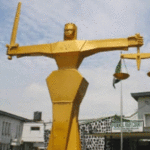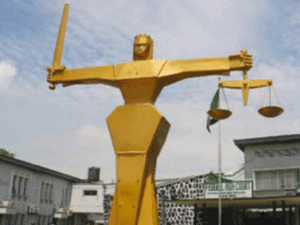The Supreme Court on Friday ruled in favor of a former police officer who is seeking to throw out an obstruction charge for joining the Capitol riot on Jan. 6, 2021, in a ruling that could benefit former President Donald Trump.
The justices on a 6-3 vote handed a win to defendant Joseph Fischer, who is among hundreds of Jan. 6 defendants — including Trump — who have been charged with obstructing an official proceeding over the effort to prevent Congress’ certification of President Joe Biden’s election victory.
The court concluded that the law, enacted in 2002 as part of the Sarbanes-Oxley Act after the Enron accounting scandal, was only intended to apply in limited circumstances involving tampering with physical evidence.
The court sent the case back to lower courts for further proceedings on whether the Justice Department could still prosecute Fischer under the new interpretation of the law.
The statute in question, 18 U.S. Code 1512, carries a prison sentence of up to 20 years.
To what extent the ruling favors Trump remains to be seen. Prosecutors in Trump’s case said that even if Fischer wins, Trump’s conduct would still be covered by a narrower interpretation of the statute.
Fischer faces seven criminal charges, only one of which was the focus of the Supreme Court case. Even if the obstruction charge is ultimately dismissed, the other charges, including assaulting a police officer and entering a restricted building, will remain in place.
The court, which has a 6-3 conservative majority, has in the past been skeptical of prosecutors when they assert broad applications of criminal provisions.
In his election interference case, Trump faces four charges, including one count of obstructing an official proceeding and another of conspiracy to do so.
In a separate case, the Supreme Court is considering Trump’s claim of presidential immunity in the election interference case, which will also affect whether all the charges remain in place ahead of a trial.
On Jan. 6, 2021, prosecutors said Fischer joined the crowd breaching the Capitol from the east side. “Charge!” he yelled again and again before he pushed forward toward a police line while yelling, “Motherf—–s!” the government says.
He and other rioters then fell to the ground. After other rioters lifted him up video disclosed as evidence in other Jan. 6 trials shows, he tried to appeal to officers protecting the Capitol, telling them that he was an officer, too.
Fischer previously served as a police officer in North Cornwall Township, Pa. (Another man named Joseph Fisher, who was also a police officer, was recently sentenced to 20 months in prison for his own role on Jan. 6.)
While there are 247 cases of the more than 1,400 Jan. 6 cases that may be impacted by Fischer, there are just 52 cases in which it is the only felony offense, and just 27 of those defendants are still serving a sentence. Most recently, Jan. 6 defendant Benjamin Martin was convicted on Wednesday of obstruction of an official proceeding, but he was also convicted of felony civil disorder and misdemeanor offenses.
Recently, judges have been factoring the pending Fischer decision into their sentencing decisions. If a defendant was convicted of another felony, like assaulting an officer, they have stated on the record that they would have reached the same decision regardless of the Supreme Court’s decision in the Fischer case.
Trump’s election interference case appears to collapse after U.S. Supreme Court rules that Jan. 6 rioters were improperly charged
The Supreme Court on Friday ruled in favor of a former police officer who is seeking to throw out an obstruction charge for joining the Capitol riot on Jan. 6, 2021, in a ruling that could benefit former President Donald Trump.
The justices on a 6-3 vote handed a win to defendant Joseph Fischer, who is among hundreds of Jan. 6 defendants — including Trump — who have been charged with obstructing an official proceeding over the effort to prevent Congress’ certification of President Joe Biden’s election victory.
The court concluded that the law, enacted in 2002 as part of the Sarbanes-Oxley Act after the Enron accounting scandal, was only intended to apply in limited circumstances involving tampering with physical evidence.
The court sent the case back to lower courts for further proceedings on whether the Justice Department could still prosecute Fischer under the new interpretation of the law.
The statute in question, 18 U.S. Code 1512, carries a prison sentence of up to 20 years.
To what extent the ruling favors Trump remains to be seen. Prosecutors in Trump’s case said that even if Fischer wins, Trump’s conduct would still be covered by a narrower interpretation of the statute.
Fischer faces seven criminal charges, only one of which was the focus of the Supreme Court case. Even if the obstruction charge is ultimately dismissed, the other charges, including assaulting a police officer and entering a restricted building, will remain in place.
The court, which has a 6-3 conservative majority, has in the past been skeptical of prosecutors when they assert broad applications of criminal provisions.
In his election interference case, Trump faces four charges, including one count of obstructing an official proceeding and another of conspiracy to do so.
In a separate case, the Supreme Court is considering Trump’s claim of presidential immunity in the election interference case, which will also affect whether all the charges remain in place ahead of a trial.
On Jan. 6, 2021, prosecutors said Fischer joined the crowd breaching the Capitol from the east side. “Charge!” he yelled again and again before he pushed forward toward a police line while yelling, “Motherf—–s!” the government says.
He and other rioters then fell to the ground. After other rioters lifted him up video disclosed as evidence in other Jan. 6 trials shows, he tried to appeal to officers protecting the Capitol, telling them that he was an officer, too.
Fischer previously served as a police officer in North Cornwall Township, Pa. (Another man named Joseph Fisher, who was also a police officer, was recently sentenced to 20 months in prison for his own role on Jan. 6.)
While there are 247 cases of the more than 1,400 Jan. 6 cases that may be impacted by Fischer, there are just 52 cases in which it is the only felony offense, and just 27 of those defendants are still serving a sentence. Most recently, Jan. 6 defendant Benjamin Martin was convicted on Wednesday of obstruction of an official proceeding, but he was also convicted of felony civil disorder and misdemeanor offenses.
Recently, judges have been factoring the pending Fischer decision into their sentencing decisions. If a defendant was convicted of another felony, like assaulting an officer, they have stated on the record that they would have reached the same decision regardless of the Supreme Court’s decision in the Fischer case.
Trump’s election interference case appears to collapse after U.S. Supreme Court rules that Jan. 6 rioters were improperly charged
The Supreme Court on Friday ruled in favor of a former police officer who is seeking to throw out an obstruction charge for joining the Capitol riot on Jan. 6, 2021, in a ruling that could benefit former President Donald Trump.
The justices on a 6-3 vote handed a win to defendant Joseph Fischer, who is among hundreds of Jan. 6 defendants — including Trump — who have been charged with obstructing an official proceeding over the effort to prevent Congress’ certification of President Joe Biden’s election victory.
The court concluded that the law, enacted in 2002 as part of the Sarbanes-Oxley Act after the Enron accounting scandal, was only intended to apply in limited circumstances involving tampering with physical evidence.
The court sent the case back to lower courts for further proceedings on whether the Justice Department could still prosecute Fischer under the new interpretation of the law.
The statute in question, 18 U.S. Code 1512, carries a prison sentence of up to 20 years.
To what extent the ruling favors Trump remains to be seen. Prosecutors in Trump’s case said that even if Fischer wins, Trump’s conduct would still be covered by a narrower interpretation of the statute.
Fischer faces seven criminal charges, only one of which was the focus of the Supreme Court case. Even if the obstruction charge is ultimately dismissed, the other charges, including assaulting a police officer and entering a restricted building, will remain in place.
The court, which has a 6-3 conservative majority, has in the past been skeptical of prosecutors when they assert broad applications of criminal provisions.
In his election interference case, Trump faces four charges, including one count of obstructing an official proceeding and another of conspiracy to do so.
In a separate case, the Supreme Court is considering Trump’s claim of presidential immunity in the election interference case, which will also affect whether all the charges remain in place ahead of a trial.
On Jan. 6, 2021, prosecutors said Fischer joined the crowd breaching the Capitol from the east side. “Charge!” he yelled again and again before he pushed forward toward a police line while yelling, “Motherf—–s!” the government says.
He and other rioters then fell to the ground. After other rioters lifted him up video disclosed as evidence in other Jan. 6 trials shows, he tried to appeal to officers protecting the Capitol, telling them that he was an officer, too.
Fischer previously served as a police officer in North Cornwall Township, Pa. (Another man named Joseph Fisher, who was also a police officer, was recently sentenced to 20 months in prison for his own role on Jan. 6.)
While there are 247 cases of the more than 1,400 Jan. 6 cases that may be impacted by Fischer, there are just 52 cases in which it is the only felony offense, and just 27 of those defendants are still serving a sentence. Most recently, Jan. 6 defendant Benjamin Martin was convicted on Wednesday of obstruction of an official proceeding, but he was also convicted of felony civil disorder and misdemeanor offenses.
Recently, judges have been factoring the pending Fischer decision into their sentencing decisions. If a defendant was convicted of another felony, like assaulting an officer, they have stated on the record that they would have reached the same decision regardless of the Supreme Court’s decision in the Fischer case.










More Stories
SERAP sues CBN over failure to disclose allocations to local govt councils
FG says Emefiele’s 753 seized duplexes will be sold to Nigerians
2027: ‘Energy driving Obi is organic, PDP needs him,’ says Sowunmi